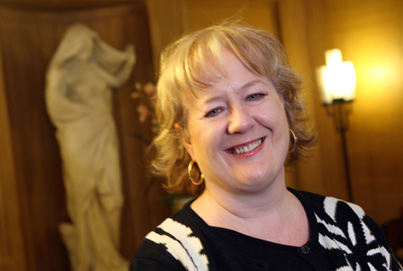Health care and chronic illness: There is a better way
Health care and chronic illness: There is a better way McGill University
User Tools (skip):
Health care and chronic illness: There is a better way

Dr. Deborah Radcliffe-Branch is Director of the “My Tool Box” program, which offers strategies and solutions for sufferers of chronic illness.
Owen Egan
Dr. Deborah Radcliffe-Branch believes changes are coming to Canada's health care system. Well, more of a tectonic shift, really. "The health care system is a little bit in a panic mode," she said, "because they see this coming."
"This" refers to the impending tsunami of chronically ill patients that can be expected in an aging population – and the need to move from an acute model of health care that reacts to problems to one that is mindful of this reality and can help patients care more for themselves.
"We just don't have the support in the system to handle all of these individuals who will have heart disease, cancer, and a variety of other chronic illnesses," she said. "There's a huge flood of chronic illness that's going to hit us in a system that's still functioning on an acute care model, where you fix them, you patch them up, and you send them home. And it just won't work."
If policy-makers mired in Canada's interminable public/private debate have failed to recognize what lies ahead, others have not. Radcliffe-Branch, for instance, was brought to the Montreal Neurological Institute with a specific mandate: to be the first program director of "My Tool Box," a free, six-session workshop designed to help individuals develop the skills needed to better manage the day-to-day challenges of living with a chronic health condition. The program was created about 20 years ago at Stanford University, and has slowly begun making its way to Canada. Radcliffe-Branch's initiative – a pilot project launched a year ago – was the first of its kind in Quebec.
"We had wonderful results" from the pilot project," said the Associate Professor in the Faculty of Medicine. The decision was made to fund the program for three years, and the first sessions will begin the week of March 10.
The program's success rests in encouraging self-management, allowing patients to take charge of those things under their control, such as diet and exercise. "If people don't feel supported by their health-care professionals, they're really left on their own to take care of themselves, and that's where this course comes in," said Radcliffe-Branch. "Because they manage so much of their illness alone, this is really teaching them how to do that in an optimal way."
"My Tool Box" represents a holistic approach meant to complement, not compete with, traditional patient education. Participants – usually 10 to 12 to a workshop – learn a plethora of skills to deal with the both the physical and emotional challenges related to chronic illness. A session on progressive muscle relaxation, for example, may be followed by a lesson in cognitive reframing – taking negative intrusive thoughts and reframing them into either neutral or positive thoughts. They also learn how to evaluate treatment options and how to better communicate with both health care professionals and loved ones.
The workshops are led not by professionals, but rather by people who suffer from chronic illnesses themselves and who have progressed to the point of being good self-managers and been trained in the program. Leaders, therefore, have much in common with participants from the start, adding an element of credibility even doctors can't offer. And though chronic illnesses differ greatly, Radcliffe-Branch noted there are always many commonalities – "things like fatigue, pain, inability to sleep, difficulty managing dietary requirements" – which the workshop is designed to highlight early on.
Participants prepare action plans with specific goals and as a group ensure they are kept on track. "And if they're not," said Radcliffe-Branch, "we problem-solve why they're not and try to come up with solutions." The end result is "patients helping patients" master techniques of self-management.
Radcliffe-Branch sees programs like "My Tool Box" as an integral part of the solution to serious problems confronting the Canadian health-care system in the near term. "Individuals don't always have the tools and the support that they need in the current health care system, and we have to do something about it," she concluded. "This is the perfect opportunity."
For more information, please contact Dr. Deborah Radcliffe-Branch by telephone (514-398-5442) or email.

